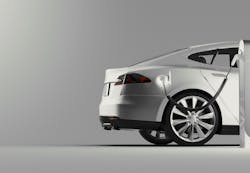Top 10 states most equipped for EV drivers: 2022 Edition
Since the last study published by Zutobi, a driving education website, in 2021, the push to increase the electric vehicle market continues. With the expectation that in 2030 50 percent of all vehicles sold will be electric and by 2035 the sale of fossil fuel vehicles will be banned, some states are heeding the call for change while others are falling behind.
The study focuses on how well each state is adapting to the rise of electric vehicles -- concentrating on which states have the infrastructure and how the number of EVs on the road compares to other vehicles. Since Zutobi's last report, the number of EVs in the U.S. has gone from 543,610 to over a million. That's an increase of 87.5 percent. Growth for charging outlets hasn't quite kept up with the growth in EVs though, as the number of charging outlets has only increased from 98,422 to 128,554, a mere 31 percent.
States with the most charging stations per EV
North Dakota, Wyoming, and Mississippi were revealed as the top three states with the most charging points per EV. The study reported that North Dakota is equipped with 139 electric charging ports and 220 registered EVs, meaning there are about one and a half electric cars for every charger. Next up, Wyoming with 184 electric charging ports and 330 EVs, meaning the state has 55.8 charging stations per 100 EVs. As for Mississippi, the state has 433 electric charging ports and 780 EVs, leaving it only slightly behind Wyoming with 55.5 charging points for every 100 EVs.
Top 10 states most equipped for EV drivers
- North Dakota
- Wyoming
- Mississippi
- West Virginia
- Rhode Island
- Vermont
- South Dakota
- District of Columbia
- Arkansas
- Maine
States with the least charging stations per EV
On the other end of the spectrum, the report found that New Jersey, Arizona, and Hawaii are struggling to keep up with the number of EVs cruising their streets. With New Jersey's 30,420 electric vehicles, there are only 2,020 charging points. That's 6.6 charging points per 100 EVs. Arizona is slightly better off, with 7.8 charging stations per 100 EVs, and Hawaii just bumps it up to 7.9 charging points per 100 EVs.
States with the highest percentage of EVs
Additionally, the study reported the states with the highest number of EVs compared to the total number of vehicles on the road. California came in first, with 425,300 EVs and a total of 13,957,692 vehicles. Hawaii came in second with 10,670 EVs and a total of 476,866 vehicles, and Washington came in third with 50,520 EVs and a total of 2,735,895 vehicles.
The study is based on data collected from the Alternative Fuels Data Center's Alternative Fueling Station Count by State and Electric Vehicle Registrations by State reports as well as the Federal Highway Administration's Highway Statistics 2020.
To view the full report, click here.

